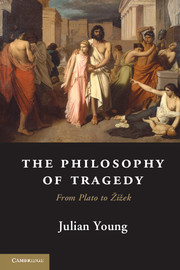Book contents
11 - Benjamin and Schmitt
Published online by Cambridge University Press: 05 June 2013
Summary
Walter Benjamin (1892–1940), the subject of the first half of this chapter, was a German philosopher and literary critic. Since he was both Jewish and a Marxist he had two good reasons for fleeing to France when Hitler came to power in 1933. His life came to a tragic end in the second year of World War II. In possession of a visa admitting him to the United States, he fled the German invasion of France into officially neutral Spain. But on hearing that Franco had cancelled all exit visas, he committed suicide. Probably his most discussed work is an essay entitled ‘The Artwork in the Age of Mechanical Reproduction’, an essay that put into circulation the concept of an artwork’s ‘aura’.
Benjamin wrote one important book on tragedy, The Origin of German Tragic Drama (Ursprung des Deutschen Trauerspiels), which was published in 1928. It had been written earlier as his Habilitationsschrift, the second PhD thesis that is a prerequisite of an academic post in the German university system. Since it was rejected as unintelligible (and it is certainly not an easy book), he never obtained an academic position and was constantly short of money.
- Type
- Chapter
- Information
- The Philosophy of TragedyFrom Plato to Žižek, pp. 188 - 206Publisher: Cambridge University PressPrint publication year: 2013

